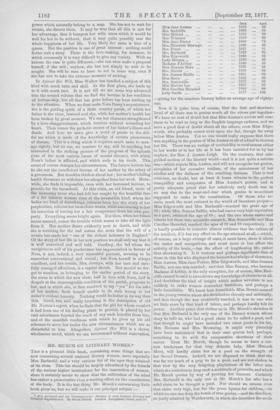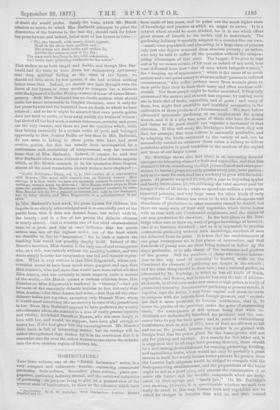MR. MURCH ON LITERARY WOMEN.* THIS is a pleasant little
book, containing some things that are new concerning several. eminent literary women, more especially Mrs. Barbauld, and a very curious list of the ages they attained at its close. This list should be largely advertised by the friends of the various higher institutions for the instruction of women, since it certainly seems to show that the cultivation of the mind has rather a preservative V.P.an a wasting effect on the constitution of the body. It is the last thing Mr. March's entertaining little book gives us, but we will make it our principal subject :—
Mrs. Barbauld and her Contemporaries: Sketches of some Eminent Literary and 44ients* 1.,.:55u1iskoomen. By Jerom Mureli. London :Donal:nails, Green, and Cu.
Died.
Aged.
Miss Jane Austen
• 0. • 114
1816
42
Mrs. Radcliffe
114
1823
59
Miss Prlitford
1855 ... 69 Mrs. Trimmer
1810
69 Miss Jane Porter ...
1850
74
Mrs. Elizabeth Montagu
1 114•
1890 ... 80
Mrs. Piozzi
• 1.
1821
81
Mra. Barbauld 461,
1.0
1822 ... 82 Miss Edgeworth
Ot.
1849 ... 82 Lady Morgan
1859 ... 82 Madame d'Arblay
1849 ... 88 Miss Hannah More ...
1.•
1833 „. 88 Mrs. Menet
1859 ... 89 Mrs. Joanna Baillie
111,
1851
89 Miss Berry ...
1852
90 Mrs. Somerville ...
14•
1872 ,.. 92
Miss Harriet Lee ...
11••
1851 ... 95 Mies Caroline Herschel
164
1848
... 98 Lady Smith ...
01.1
1877 ... 103 —giving for the nineteen literary ladies an average age of eighty. one.
Now it is quite true, of course, that the first and shortest. lived of all these was in genius worth all the others put together • We have no sort of doubt but that Miss Austen's novels will con- tinue to be read as long as the English language endures, and we have a good deal of doubt about all the others, even Miss Edge- worth, who probably comes next upon the list, though far away below Miss Austen. Yet no one would really suppose that there was anything in the genius of Miss Austen at all of a kind to shorten her life. There was no vestige of excitability or restlessness either in her works or in her life as it has been narrated for us by her nephew, the Rev. J. Austen-Leigh. On the contrary, that mis- guided section of the literary world—and it is not quite a minute one—which rejects Miss Austen, and will not recognise her genius, complains of her excessive realism, of the minuteness of her studies and the dullness of the resulting fictions. That is bad criticism, no doubt, but at least it bears witness to the perfect tranquillity and composure of Miss Austen's genius, and is pretty adequate proof that her relatively early death was in no way due to the wear-and-tear which genius is sometimes
supposed to make in the constitution. Of those who re- main, much the most eminent in the world of literature proper_ Miss Edgeworth and Mrs. Barbauld—reached the great age of 82; while Mrs. Joanna Baillie, who had once a very high reputation as a poet, attained the ago of 89; and the two whose tastes and talents led them into scientific research, Mrs. Somerville and Miss Caroline Herschel, reached the ages of 92 and 98 respectively. It is hardly possible to conceive clearer evidence that the culture of the intellect, if it has any effect on the age attained at alb—which, of course, on a large average of cases, it must have, since it alters the tastes and occupations, and must more or less affect the activity of the brain,—has the effect of lengthening life rather than shortening it. It is curious and perhaps significant that of those in this list who displayed the keenest knowledge of character, Miss Austen, Miss Jane Porter, Miss Edgeworth, and Miss Joanna Baillie, not one was married ; and that Miss Burney, who became Madame d'Arblay, is the only exception, for of course, Mrs. Rad- cliffe cannot be said to have shown any knowledge of charaeterat all. And doubtless the kind of insight which makes novelists is not unlikely to make women somewhat fastidious, and perhaps a little formidable. We know how formidable Miss Bronte seemed to the young curates whom she sketched so cleverly and satirically, and that though she was eventually married, it was to one who set little store by that kind of talent, and perhaps hardly felt its power. Another point that strikes us in Mr. Murch's sketches is that Mrs. Barbauld is the only one of the literary women whose story be tells us, who had a good claim to be called a poet, and that though he might have included two other poets in his list, Mrs. Ileums and Mrs. Browning, it might very plausibly have been maintained that in their case genius had, perhaps, something to do with the comparative shortness of their career. Even Mr. Murch, though he seems to have a cer- tain tenderness for that very didactic lady, Miss Hannah More, will hardly claim her as a poet on the strength of her Sacred Dramas. Indeed, we are disposed to think that she was far too much of a prig to be a poet, and are not shaken in that view by the very fatiguing playfulness of the letter into which she contrives to drag such a multitude of proverbs, a-nd which Mr. Murch quotes by way of proving her humour. Certainly Mrs. Barbauld is the only one in Mr. Murah's list who has a solid claim to be thought a poet. Nor should we esteem even that claim very high, but for the prose hymns for children,—to which no one can deny the touch of true genius,—and the fine lines, so justly admired by Wordsworth, in which she describes the mode
of death she would prefer. Surely the verse which Mr. Murch admires so much, in 'which Mrs. Barbauld attempts to paint the dissolution of the heavens in the last day, should rank far below her prose hymns, and indeed, below most of her hymns in verse " The sun himself, with weery clouds opprost, Shall in his silent dark pavilion rest ; His golden urn shall broke and useless lie, Amidst the common ruin of the sky ; The stars rush headlong in the wild commotion, And bathe their glittering foreheads in the ocean."
That strikes us as both turgid and feeble, and though Mrs. Bar- bauld had the taste to tone down her declamatory astronomy into deep spiritual feeling at the close of the hymn, we should set little store by her genius, if she had written nothing better than that. Indeed, wo should not have thought even the finest of her hymns in verse worthy to compare for a. moment with the hymns of Charles Wesley or some of those of James Mont- gomery. Still, Mrs. Barbauld has no doubt written what should make her name memorable in English literature, were it only for her prose hymns and the beautiful lines on death to which we have referred ; and so far it might be asserted that even poetic genius does not tend to excite or wear away unduly the brains of women ; but then of all her best work, a certain innocence, serenity, and peace are the very essence, and these are just the qualities which, while they belong essentially to a certain order of poet, and belonged ,apparently to Mrs. Joanna Baillie no less than to Mrs. Barbauld, do not seem to belong to those poets who have had most .crecrtive genius, for this has usually been accompanied by a restlessness and excitability of temperament very far removed from that of Mrs. Barbauld. Indeed, it cannot be said that Mrs. Barbauld often. wrote without a touch of that didactic impulse which, as Mr. Murch reminds us in his quotation from Rogers, almost all the most remarkable literary women have displayed :— " Crabb Robinson—Diary, vol. i., p. 144—writes of a conversation . with Rogers, His most solid remark was on literary women. How strange it is that while we men are modestly content to atallf10 by our writings, women must be didactic I Miss Bairn° writes plays to illus- trate the passions, Miss Martineau teaches political economy by tales, Mrs. Mama sots up for a general instructor, not only in her dialogues, but in fairy stories, and Miss Edgeworth is a schoolmistress in her tales.'" In Mrs. Barbauld's best work, the prose hymns for children, this impulse is so simply acknowledged and is so essentially part of the poetic form, that it does not detract from, but rather adds to, the beauty ; and in a few of her poems the didactic element is nearly absent. Still it remains one of her chief characteristics oven as a poet, and this at once indicates that her poetic nature was not of the highest order, not of the kind which we describe as due to "inspiration,' for in such a nature the teaching bias could not possibly display itself. Indeed of Mr. Murch's heroines, Miss Austen is the only one of real consequence who, as a rule, was entirely without the teaching instinct, and who wrote simply because her imagination was full and wanted expres- sion., What is very curious is that Miss Edgeworth, whose con- versation seems to have been much more pungent and racy than Miss Austen's, who had more that would have been called wit than Miss Austen, and was certainly in most respects more a woman of the world,--Mr. Murch quotes a curious criticism from Mrs. Fletcher on Miss Edgeworth's tendency to " blarney,"—had yet far more of the essentially didactic impulse in her, not only than Miss Austen,--for Miss Austen had none,—but than all the other didactic ladies put together, excepting only Hannah More, whom it would need something like an eternity to cure of the preachiness in her. Even Mrs. Barbauld appears to have preferred the worthy schoolmaster whom she married to a man of vastly greater capacity and vitality, Archibald Hamilton Rowan, who was once deeply in love with her, and would, we suppose, have been glad enough to marry her, if she had given him any encouragement. Mr. Muscles little book is full of interesting matter, but its readers will be rather strengthened than shaken by it in the conviction that it is
somewhat rare for even the ablest women to rise above the didactic into the true creative region of literary life,































 Previous page
Previous page